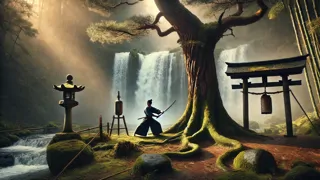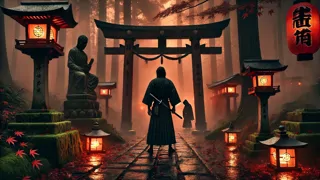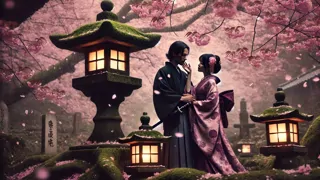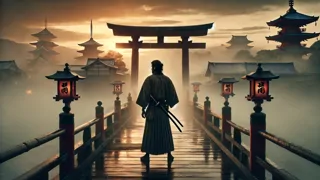Introduction
At the edge of Edo, where the calm waters of the Sumida meander under wooden bridges, dawn broke with a whisper of jade and rose. The great red torii gates cast long shadows across dewy rice paddies, and lantern light lingered in silence as carp fishermen whispered prayers to the rising sun. Amid the scattered temples and bustling markets, a lone figure walked with purpose, clad in weathered hakama and a faded kimono stained by his past. This was Masaru, the ronin whose master fell by treachery’s blade. He carried nothing but two steel blades—one of tradition, the other an instrument of retribution—and a heart torn by the strict codes of bushido. For years, Masaru had wandered borders and backstreets, seeking the path that would honor his clan’s memory. Yet the more he advanced, the more he found his purpose divided: to uphold the unyielding path of honor, to avenge the betrayal that spilled his lord’s blood, or to surrender to the fragile blossom of a forbidden love that bloomed beneath Edo’s cherry trees. In the feudal heart of Japan, every choice demanded its toll, every vow its price. And so, Masaru stood between the gentle caress of love’s promise and the fierce blaze of vengeance, wondering which destiny his blades would carve into history.
The Path of Honor
From childhood, Masaru had been steeped in ritual and discipline. Born to a minor Samurai household in a province east of Edo, he learned the art of the blade before he could even clutch a wooden sword with purpose. His master, Lord Hidekawa, regarded him as both pupil and adopted son, guiding him through the austere mornings of meditation and rigorous training under Kirisame Falls. Each form, each stance, carried the weight of tradition, a living echo of ancestors whose steel had defended countless generations. Masaru’s crimson sash marked him as part of Hidekawa’s elite guard, a symbol not of personal glory, but of unwavering loyalty to a lord who sought justice above ambition. Under the boughs of an ancient pine, he sharpened his spirit as much as his blades, reciting the kataginu oath of the Samurai code: truth, courage, benevolence, respect, sincerity, honor, and loyalty.

Yet when the political tides shifted in the corridors of power, Hidekawa’s honor was besmirched by false rumors. Conspirators spun webs of deceit to unseat him, jealous retainers manipulated scores behind closed shoji screens, and soon the lord’s banner lay in disgrace. Masaru confronted the verdict of dishonor as though he faced a rival in mortal combat. In the courtyard of the castle, he offered his submission not as defeat but as fertile ground for redemption. He vowed to clear Hidekawa’s name or die in the attempt, believing that true honor demanded sacrifice. With a final bow before his fallen lord’s shrine, Masaru sheathed his katana in sorrow and anger, setting off on the path that would define his life.
Now, as rumor and gossip swirl through Edo’s teahouses like stray petals in a windstorm, Masaru contemplates the first step on his journey. He will either join a new clan that honors his unwavering spirit, serve under a daimyo who upholds the code, or renounce official ties entirely, becoming a shadow among shadows—an instrument of vengeance against those who betrayed him. Yet the bushido path awakes an echo of doubt in his mind: if he forsakes duty for revenge, what honor remains? Each footfall across the battered planks of this wooden bridge reminds him that a true Samurai’s heart must be as unbroken as his blade. And so, with dawn’s light illuminating his silent vow, Masaru strides toward a destiny forged from steel and conscience.
Shadows of Vengeance
Driven by the bitter taste of dishonor, Masaru ventured into the winding backstreets of Edo’s merchant quarter. Shadows draped across the narrow alleys as lanterns flickered against damp walls, and every whispered conversation could carry the weight of a curse. He followed rumors—merchants who had witnessed a black-robed assassin slip through the gates of Hidekawa’s keep, sushi chefs who overheard late-night pacts sealed in sake chalices. Each clue became a blade’s edge, cutting away his doubt even as it opened wounds of anger. Vengeance, once a distant ember in his soul, now blazed as a beacon guiding his steps beneath wooden eaves slick with rain.

Masaru confronted his first adversary beneath the crimson arches of a Shinto shrine at dusk. A hired killer, garbed in a dark hood and clutching a serrated dagger, rose silently from the mist like a specter. Their blades sang in the hush of night—steel against steel—while the shrine’s lanterns bore witness to a duel of fate. Masaru moved with the fluidity of water, parrying each strike with the precision learned in Hidekawa’s court. When the final blow landed, it was delivered with the restraint of a man who still held mercy in his heart, even as he avenged his master’s tarnished name.
Still, every act of vengeance only led to deeper intrigue. Masaru uncovered the names of corrupt councilors, their seals soaking in blood and bribery, and discovered that the path to justice would demand more sacrifices than he had ever imagined. Each reclaimed truth brought satisfaction, but also a hollow ache—honor unbalanced by vengeance threatens to consume the soul. At the heart of it all lay the choice that had plagued him since dawn: would Masaru’s blade cleave justice from deceit, or sever the bonds that tethered him to the very code he swore to uphold?
The Blossom of Romance
Amid the tumult of vengeance and honor, Masaru encountered a gentle presence that threatened to unravel his resolve: Aiko, the daughter of the head priest at Tenjin Shrine. Her kimono bore delicate plum blossom patterns, and she moved with the grace of a crane among cherry blossoms. Their paths crossed when Masaru, nursing wounds from recent skirmishes, sought shelter under the shrine’s torii. She offered him herbal poultices and warm sake, her voice a calming melody against his restless spirit. In her eyes, Masaru found a mirror of his own longing: a quiet hope that kindness could bloom even in hearts hardened by steel.

Through stolen twilight conversations beneath flowering boughs, they shared their burdens. Aiko spoke of dreams beyond the temple grounds—paintings, poems, freedom from the weights of lineage—while Masaru confessed the turmoil that guided his blade. Each word wove a fragile bond, as soft and luminous as moonlight on water. But with every stolen glance, the danger of his mission grew with equal measure; the government’s spies were ever-watchful, and mercy offered in the open could be twisted into another act of betrayal.
In the hush before dawn, they embraced beneath a canopy of pink petals. Aiko’s hand rested against Masaru’s cheek, warm and alive, as if sealing a vow more binding than any tile-roofed contract. In that moment, Masaru’s heart trembled between two blades: the unshakable resolve of vengeance and the tender promise of love. Cherry blossoms drifted around them, each petal a reminder that beauty is fleeting, and to seize its grace could cost him everything.
Conclusion
In the end, Masaru stood once more at dawn’s threshold, the mists of Edo swirling around him like whispered memories. He carried the weight of many blades, each etched by duty, vengeance, or love, yet only one could define his path. In the quiet moments before sunrise, he recalled the faces of his fallen master, the hardened eyes of the assassin he felled, and the gentle warmth of Aiko in his arms. The code of bushido taught that a Samurai must choose sacrifice over self, yet his heart revealed a deeper truth: honor without compassion is but a hollow shell, and vengeance untouched by mercy leaves only ash behind. With steady breath, Masaru found clarity. He would walk the way of the ronin, guiding his remaining moments with a blade tempered by justice, a spirit uplifted by love, and a soul bound forever to the memory of those he had served, avenged, and cherished. As the first rays of gold spilled across Edo’s rooftops, Masaru sheathed his katana. His quest was complete—not by the death of enemies or the vows of service, but by the harmony he had forged between steel and heart. And under the watchful gaze of awakening cranes, he stepped forward into a new dawn, where the legacy of a true Samurai would blossom in every act of courage, mercy, and love.



















